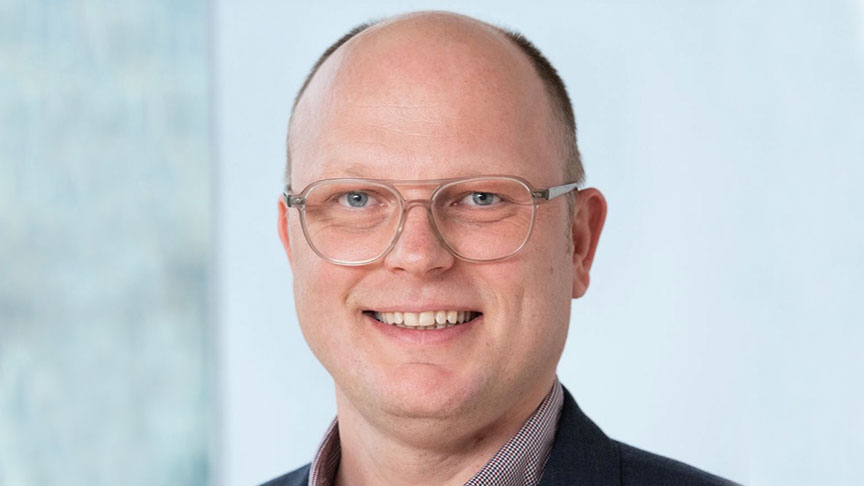Interview: Klaus Lüber
“A best-practice model for cooperation”
What contribution can the German Centres for Research and Innovation (DWIH) make to science diplomacy? Dr Jan Lüdert, Head of Programs at the DWIH New York, talks about this in our interview.
Dr Lüdert, science diplomacy aims to help address global challenges more effectively. What role does the network of German Centres for Research and Innovation (DWIH) play in this context?
The DWIH network can be regarded as a best-practice model for cooperation between science and research institutions abroad. We see ourselves as a branch of Germany’s science diplomacy with the goal of encouraging international science collaboration between stakeholders by establishing interfaces between research, industry and policymaking.
What concrete form does this take?
Examples that illustrate the work being done by the DWIH New York include the Science Diplomacy in International Organizations event that took place in 2022 and the meeting at the United Nations’ New York Headquarters in 2023, which explored how best to integrate the Sustainable Development Goals into higher education. In arranging these expert discussions, the DWIH New York worked together with its partners from the German Consulate General and members of its network of supporters, as well as with participants in leading research institutions, the United Nations, universities and non-governmental organisations. Our objective was to identify the role that various stakeholders play in multilateralism today and the relevance of science diplomacy for international organisations. In this context, assessing the degree to which sustainable development has been implemented as a national strategy in Germany, by comparison with other countries, is crucial in terms of the success of science diplomacy.
Lamentably, academic freedom is on the decline worldwide; the Federal Foreign Office talks of “shrinking spaces”. What opportunities to counter this trend does science diplomacy offer?
In this regard, the DAAD’s 2022 position paper Science Diplomacy for a Multipolar World proposes that a new brand of science diplomacy should be devised and developed that is not only values-based but also encompasses an interest-driven dimension. It would assess global issues, upheavals and system rivalries in a regionally nuanced manner, reflecting on their respective risks. This is something that the DWIH network is very capable of achieving thanks to the activities it pursues in its host countries – activities which are rooted in local participation. It is also important in this context for science diplomacy to tackle challenges that are becoming increasingly complicated by power-political considerations. This “new” science diplomacy fosters civil society dialogue, the sustainable development of society and business and the preservation of national interests. Such science diplomacy aligns these goals differently from region to region and weighs the opportunities and risks of international cooperation against each other. In an increasingly multipolar world, this approach contributes to the negotiation and implementation of multilateral partnerships and helps actively counter “shrinking spaces”.
A loss of confidence in science is increasingly cited as another challenge. How serious is this problem?
The DWIH network, as an “implementer” of science diplomacy, takes this question very seriously. The reason for this is simple: science is a central element of modern societies and international relations. And yet the authority that science and its epistemic communities have traditionally held in higher education, industry and political institutions can no longer be taken for granted. The systematic and unjustified rejection of science, i.e. science scepticism, has become a societal problem that poses a threat to the very fabric of liberal democracies and a values-based global order. Academic freedom and scientific exchange require an environment in which freedom of expression forms the basis for critical, interdisciplinary and intersectoral engagement rather than being restricted by sceptics and a distrust of evidence-based research. The work done by the DWIH New York in a primarily transatlantic context plays a supporting role here. As a network, we try to build up trust and confidence at our global sites by bringing together specific stakeholders and representatives of science, industry and politics and inviting them to engage in critical discourse.
What role do independent intermediary organisations such as the DAAD play?
The DWIH network is funded by the Federal Foreign Office, while the DAAD in Bonn centrally coordinates the work done by the DWIH. The Federal Foreign Office regularly delegates administrative and implementational tasks to intermediary organisations like the DAAD, which then act as an interface between science and politics. The latter is particularly important in this context, as the DAAD sets the parameters for the science diplomacy that the DWIH fosters – but also plays back to the DAAD – via its network. What is unique about the DWIH with respect to science diplomacy is thus its ability to bring about closer ties between science, business, politics and civil society. The DWIH can create safe spaces in which different national and sectoral stakeholders can get together to jointly identify opportunities and challenges. This is what gives the DWIH a distinct and important role in international science diplomacy. –
As a political scientist specialising in international relations, Dr Jan Lüdert has long been engaging with the topic of science diplomacy. He has been Head of Programs at the German Center for Research and Innovation (DWIH) New York since April 2022.

